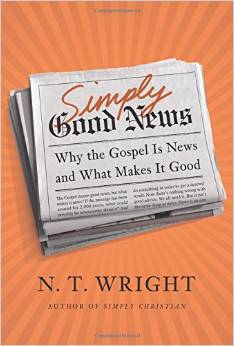 There’s not really words to describe the joy and confidence I experienced as I read New Testament scholar N.T. Wright’s latest book, Simply Good News. In it, Wright argues that too many people (Christians and nonbelievers) think that the Gospel is “good advice” (how to live or get eternal life or be successful or whatever), but that in fact it is “good news“: “It is the news that something has happened as a result of which the world is a different place” (16). Wright points to the Roman world’s understanding of Gospel (an emperor’s proclamation of victory for the nation) in order to provide context for how the early Christians’ proclamation would be heard:
There’s not really words to describe the joy and confidence I experienced as I read New Testament scholar N.T. Wright’s latest book, Simply Good News. In it, Wright argues that too many people (Christians and nonbelievers) think that the Gospel is “good advice” (how to live or get eternal life or be successful or whatever), but that in fact it is “good news“: “It is the news that something has happened as a result of which the world is a different place” (16). Wright points to the Roman world’s understanding of Gospel (an emperor’s proclamation of victory for the nation) in order to provide context for how the early Christians’ proclamation would be heard:
Starting with Octavian, the Roman emperors regularly used the words good news to describe both what they had already achieved and what life would be like as a consequence. When the early Christians used this language, they used it in a similar way (12).
Wright goes on to argue convincingly that the resurrection was in fact a real event that actually took place. He offers careful reasoning for why he believes Jesus’s resurrection was an actual event (and has made his argument in longer form in such works as the 800-page book , The Resurrection of the Son of God). One element that I found particularly helpful in his argument was his careful parsing of the difference between history and science as disciplines. In answering questions from readers, I think I have frequently missed that we can know the truth of the resurrection today through use of the discipline of history more than through use of the discipline of science. After stating that he regards the Gospels as basically trustworthy (another claim that he has substantiated in longer tomes), Wright says:
This isn’t to say that we can “prove” everything in them. Of course we can’t. Hardly anything in history works like that. The demand for proof often comes from people who have scientific proof in mind. But that’s not how history works. Science normally studies things that we can repeat: experiments, observations, laboratory tests. History necessarily studies things that cannot be repeated. It works from evidence and looks for high probability about what caused that evidence. Like science, however, history works by hypothesis and verification.
Wright argues that you can have a historical kind of certainty about the resurrection more than a scientific kind. He makes a number of other convincing points, but I found this one in particular tremendously helpful.
















